Coursera, an online learning platform, brings education from top universities and companies right to your computer and phone.
You can learn new skills, earn certificates, and even get degrees without leaving your home. The platform offers thousands of courses on various topics, including business, technology, health, life sciences, language learning, social sciences, arts, and humanities.
Watch video lessons, complete assignments, and interact with other students from around the world. Many courses start for free, and you can upgrade to get certificates. This article will guide you through everything you need to know about using Coursera effectively.
How Coursera Courses Work?
Coursera is not self-accredited, but it is partnered with various top universities and companies that are accredited, offering access to Coursera courses.
Here are the details that make clear how Coursera courses work;
1. Video Lectures
Most courses include short video lessons, usually 5-15 minutes long. These videos break down complex topics into easy-to-understand segments. You can watch them at your own pace, pause, rewind, or speed up as needed.
2. Assignments and Quizzes
After watching videos, you complete assignments to practice what you learned. These might include multiple-choice quizzes, written assignments, or hands-on projects. The platform automatically grades many assignments and gives instant feedback.
3. Discussion Forums
Every course has discussion boards where you can ask questions, share ideas, and connect with other students. Instructors and teaching assistants often join these conversations to help you.
4. Deadlines and Schedules
Some courses have suggested deadlines to help you stay on track, but most allow flexible scheduling. You can learn at your own speed and fit studying around your other commitments.
How To Get Started On Coursera?
Follow these steps to get started with Coursera:
Step 1: Create Your Account: Visit the Coursera website and click Login.
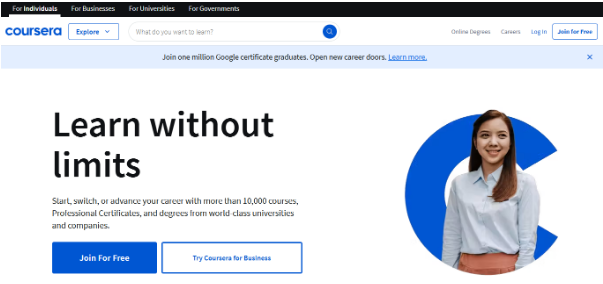
Step 2: If new to Coursera, sign up using your email address. You can also sign up using your Google or Facebook account for quicker access.
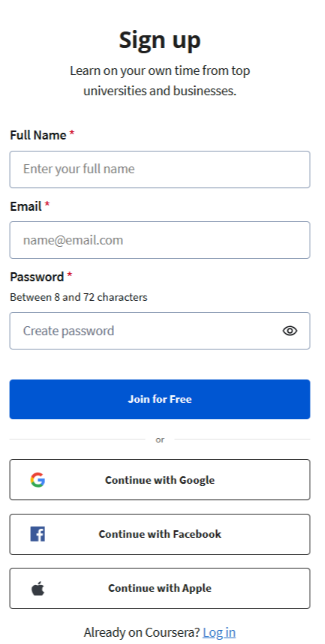
Step 3: Browse and Choose Courses: Use the search function or browse by subject to find courses that interest you.
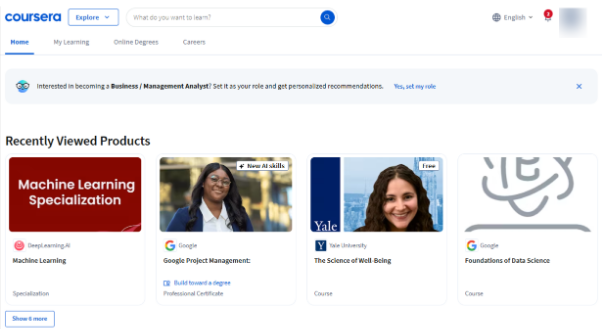
Step 4: Enroll in a Course: Click ‘Enroll for Free’ to audit a course or choose a paid option for full access. Some courses start immediately, while others have specific start dates.
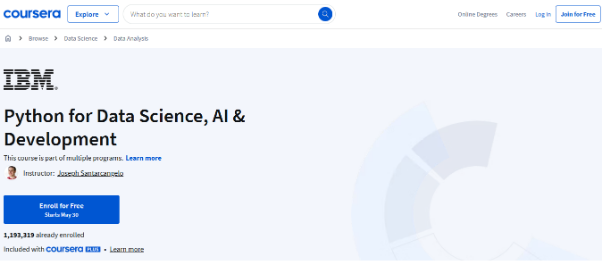
Learn how to audit Coursera courses and take advantage of this option available on your chosen courses.
You can also install the Coursera app on your mobile device or tablet, or computer to learn on the go. You can download videos to watch offline when you don’t have internet access.
Types Of Learning Options
Coursera offers a range of learning options, from individual courses to complete degrees. Coursera Plus on Coursera is worth it for many learners who are planning to pursue courses in any one of the following options.
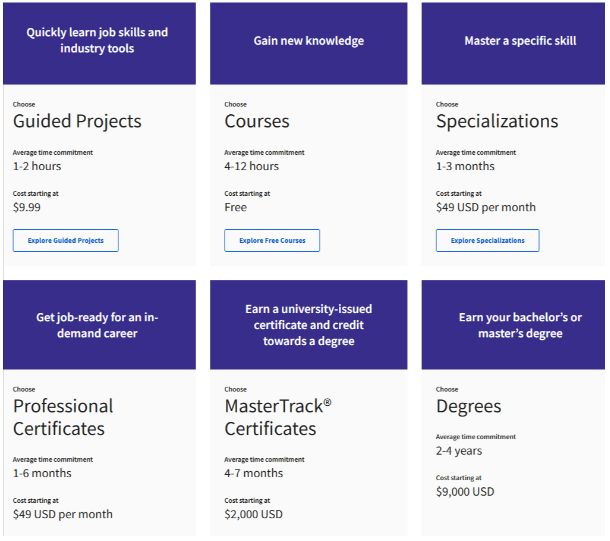
1. Individual Courses
Single courses focus on specific topics and typically take 4 to 12 hours to complete. It is perfect for learning a particular skill quickly.
2. Specializations
These are a series of related courses that build upon each other. Specializations usually take 1-3 months to finish and often include a final project where you apply everything you learned.
3. Professional Certificates
Career-focused programs by companies like Google and Facebook. These prepare you for specific job roles and typically take 1-6 months to complete.
4. MasterTrack Certificates
University-issued certificates that count toward degree credit. These programs take 4-7 months and offer academic rigor at the graduate level.
5. Guided Projects
Short, hands-on projects lasting 1-2 hours, where you learn by doing. They are great for getting practical experience with tools and software.
6. Degree Programs
Accredited universities offer full bachelor’s and master’s degree programs. These take 2-4 years to complete and cost significantly more than other options.
Coursera Pricing & Plans: Detailed Cost Breakdown
Coursera offers flexible pricing options for different learning goals and budgets. The platform provides free courses, affordable monthly subscriptions, and premium programs to suitable for every learner’s needs.
| Coursera Plans | Cost |
|---|---|
| Individual Courses | Free |
| Guided Projects | $9.99 |
| Specializations | $49 per month |
| Professional Certificates | Starting from $49 per month |
| MasterTrack Certificates | Starting from $2,000 |
| Degrees | Starting from $9,000 |
| Single Learning Program | $49-$79 per month |
| Coursera Plus Monthly | $59 per month |
| Coursera Plus Annual | $399 per year |
Coursera Plus Monthly provides access to over 10,000 courses and specializations from 350+ leading universities and companies.
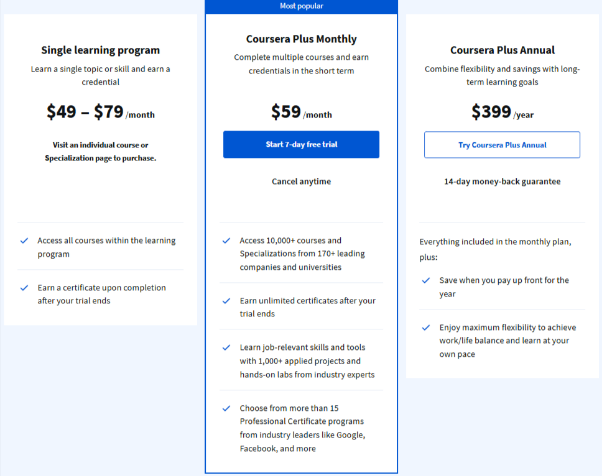
You can earn unlimited certificates, learn job-relevant skills through 1,000+ applied projects, and choose from 15+ Professional Certificate programs from industry leaders like Google and Facebook.
The annual plan offers maximum flexibility with 40% savings for work-life balance and includes everything from the monthly plan. All paid subscriptions come with a 14-day money-back guarantee, allowing you to try the service risk-free and cancel anytime.
How Does The Coursera Free Trial Work?
Coursera offers a 7-day free trial on Coursera Plus, giving you unlimited access to thousands of courses, specializations, and certificates from top universities without any upfront payment.
Here are the steps to claim a Coursera free trial:
Step 1: Visit the Coursera Plus official website and look for the ‘Start 7-day Free Trial’ button on the homepage.

Step 2: Sign up using your email address, Google account, or Facebook account. Fill in your basic information to create your profile.
Step 3: Select the Coursera Plus Monthly option, which automatically includes the 7-day free trial period.
Step 4: Add your credit card details. You won’t be charged during the trial period, but payment information is required for billing after the trial ends.
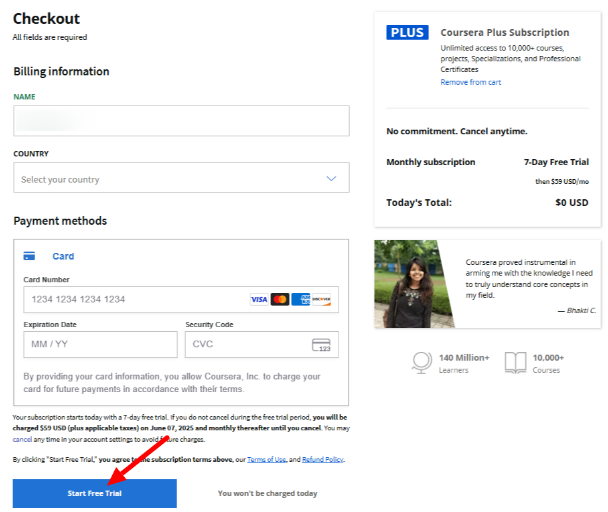
Step 5: Once registered, you immediately get access to over 10,000 courses, specializations, and professional certificates from leading universities and companies.
You can cancel your subscription anytime during the trial period through your account settings without any charges or penalties.
Tips For Success On Coursera
Here are tips you can follow to get more from Coursera.
- Set a Schedule: Create a regular study routine, even if it’s just 30 minutes a day. Consistency helps you retain information better than cramming.
- Take Notes: Write down key points while watching videos. This helps you remember important concepts and makes it easier to review later.
- Participate in Forums: Join discussions with other students. Explaining concepts to others and asking questions deepens your understanding.
- Practice What You Learn: Apply new skills to real projects outside of coursework. This helps you remember information and builds your portfolio.
- Start with Free Courses: Try auditing a course before paying for certificates. This helps you understand the platform and decide if the teaching style works for you.
More Suggested Reads:
Conclusion: Coursera Works By Providing Educational Video Lessons
Coursera transforms traditional education by making high-quality learning accessible to everyone with an internet connection.
The platform’s flexible structure allows you to learn at your own pace while still providing the credibility of a university education. Start with topics that interest you, engage with the community, and don’t be afraid to ask questions.
Pick a course that excites you, create your free account, and begin your learning journey today.
FAQs
Coursera certificates demonstrate skills to employers and can enhance your resume, especially when earned from reputable universities and recognized companies.
Coursera requires strong self-discipline and motivation since courses lack face-to-face interaction and immediate instructor support for personalized learning experiences.
You can add Coursera certificates to your resume under the education or skills sections, including the issuing university and completion date.
Coursera degrees are fully accredited and issued by partner universities, making them legitimate qualifications recognized by employers and academic institutions worldwide.
Coursera certificates never expire and remain valid permanently, providing lifetime proof of your completed coursework and acquired skills from the platform.

